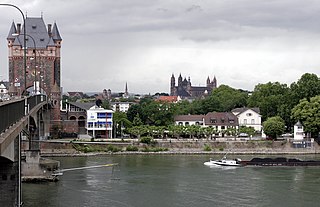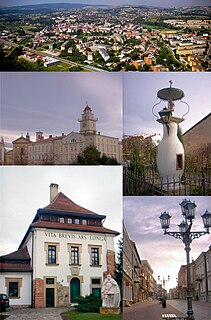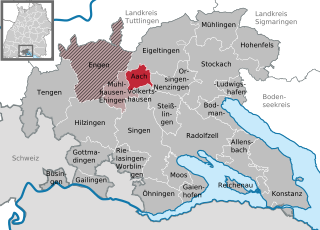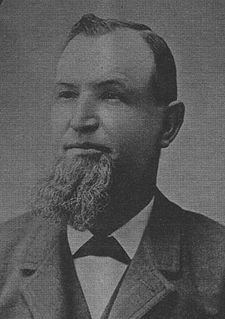
Worms is a city in Rhineland-Palatinate, Germany, situated on the Upper Rhine about 60 kilometres south-southwest of Frankfurt-am-Main. It had approximately 82,000 inhabitants as of 2015.
Hebrews is a term appearing 34 times within 32 verses of the Hebrew Bible. While the term was not an ethnonym, it is mostly taken as synonymous with the Semitic-speaking Israelites, especially in the pre-monarchic period when they were still nomadic. However, in some instances it may also be used in a wider sense, referring to the Phoenicians, or to other ancient groups, such as the group known as Shasu of Yhw on the eve of the Bronze Age collapse.

Lexington is a city in and the county seat of Holmes County, Mississippi, United States. The county was organized in 1833 and the city in 1836. The population was 1,731 at the 2010 census, down from 2,025 at the 2000 census. The estimated population in 2016 was 1,573. It has declined with the growth of industrial agriculture. Many people have left the rural county to seek work elsewhere.

Gelsenkirchen is the 11th largest city of Germany's most populous federal state of North Rhine-Westphalia and its 262,528 (2016) inhabitants make it the 25th largest city of Germany. On the Emscher River, it lies at the centre of the Ruhr, the largest urban area of Germany, of which it is the fifth largest city after Dortmund, Essen, Duisburg and Bochum. The Ruhr is located in the Rhine-Ruhr Metropolitan Region, one of Europe's largest urban areas. Gelsenkirchen is the fifth largest city of Westphalia after Dortmund, Bochum, Bielefeld and Münster, and it is one of the southernmost cities in the Low German dialect area. The city is home to the famous football club Schalke 04, which is named after Gelsenkirchen-Schalke. The club's stadium Veltins-Arena, however, is located in Gelsenkirchen-Erle.

Gorlicepronounced [ɡɔrˈlʲit͡sɛ] is a city and an urban municipality ("gmina") in south eastern Poland with around 29,500 inhabitants (2008). It is situated south east of Kraków and south of Tarnów between Jasło and Nowy Sącz in the Lesser Poland Voivodeship, previously in Nowy Sącz Voivodeship (1975–1998). It is the capital of Gorlice County.

Jews have been present in Greece since at least the fourth century BC. The oldest and the most characteristic Jewish group that has inhabited Greece are the Romaniotes, also known as "Greek Jews". However, the term "Greek Jew" is predominantly used for any person of Jewish descent or faith that lives in or originates from the modern region of Greece.

Eggenstein-Leopoldshafen/BW is a municipality of about 15000 inhabitants located in the federal state of Baden-Württemberg in the Federal Republic of Germany. It lies about 12 km north of Karlsruhe and is the site of the northern campus of a research centre Karlsruhe Institute of Technology (with the Forschungsreaktor 2. In the west, Eggenstein-Leopoldshafen borders on the Rhine River.

Aach is a small town in the German state of Baden-Württemberg. Being situated close to Lake Constance and the Swiss border, it is mostly known for the Aachtopf — Germany's biggest natural spring in terms of production.

Oria is a town and comune in the Apulia region, in the province of Brindisi, in southern Italy. It is the see city of the Roman Catholic Diocese of Oria.

Ochtrup is a town in the district of Steinfurt, in North Rhine-Westphalia, Germany. It is situated approximately 20 km west of Rheine and 20 km east of Enschede.

Bad König is a town and resort (Kurort) in the central Odenwald in the Odenwaldkreis (district) in Hesse, Germany, 29 km southeast of Darmstadt.

Ichenhausen is a town in the district of Günzburg, in Bavaria, Germany. It is situated on the river Günz, 9 km south of Günzburg.

Jews in Bohemia, today's Czech Republic, are predominantly Ashkenazi Jews, and the current Jewish population is only a fraction of the pre-Holocaust Jewish population. As of 2005, there were approximately 4,000 Jews living in the Czech Republic. There is evidence that Jews have lived in Moravia and Bohemia since as early as the 10th century.

Gailingen am Hochrhein is a village in the district of Konstanz in Baden-Württemberg, in southern Germany.

Hainsfarth is a municipality in the district of Donau-Ries in Bavaria in Germany.

Hundsbach is an Ortsgemeinde – a municipality belonging to a Verbandsgemeinde, a kind of collective municipality – in the Bad Kreuznach district in Rhineland-Palatinate, Germany. It belongs to the Verbandsgemeinde of Meisenheim, whose seat is in the like-named town.

Laubenheim is an Ortsgemeinde – a municipality belonging to a Verbandsgemeinde, a kind of collective municipality – in the Bad Kreuznach district in Rhineland-Palatinate, Germany. It belongs to the Verbandsgemeinde of Langenlonsheim, whose seat is in the like-named municipality. Laubenheim is a winegrowing village.

Rümmelsheim is an Ortsgemeinde – a municipality belonging to a Verbandsgemeinde, a kind of collective municipality – in the Bad Kreuznach district in Rhineland-Palatinate, Germany. It belongs to the Verbandsgemeinde of Langenlonsheim, whose seat is in the like-named municipality. Rümmelsheim is a winegrowing village.

Stipshausen is an Ortsgemeinde – a municipality belonging to a Verbandsgemeinde, a kind of collective municipality – in the Birkenfeld district in Rhineland-Palatinate, Germany. It belongs to the Verbandsgemeinde of Rhaunen, whose seat is in the like-named municipality.

Adelebsen is a municipality in the district of Göttingen, in Lower Saxony, Germany. It consists of the localities Adelebsen, Barterode, Eberhausen, Erbsen, Güntersen, Lödingsen and Wibbecke. The Burg Adelebsen is located on a high point in Adelebsen proper.




























